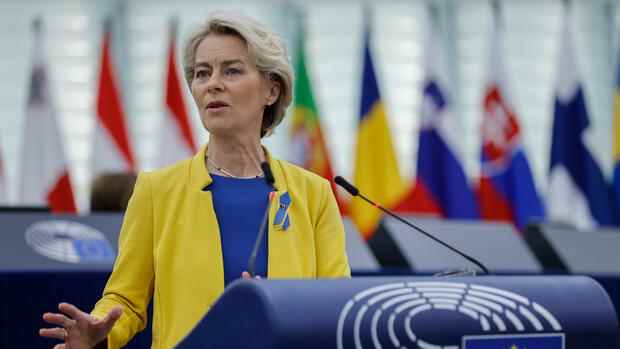Luxembourg To relieve consumers, excessive profits from energy companies in the EU are to be skimmed off and redistributed in future. EU Commission President Ursula von der Leyen announced on Wednesday in the Strasbourg European Parliament a proposed law against high energy prices, which would affect both producers of renewable electricity and gas and oil companies. “Our proposal will bring more than 140 billion euros for the member states to cushion the emergency immediately,” said von der Leyen.
According to von der Leyen, the proposed law stipulates that excessive profits from many electricity producers should be distributed to consumers in order to relieve them of the high costs. The price of electricity is currently being driven by the high price of gas, and producers of cheaper electricity – such as from the sun, wind, nuclear power or coal – can also sell it at the high prices.
Companies that do not produce electricity from gas should give away part of these profits. According to a draft, revenue from 180 euros per megawatt hour should go to the state. Relief measures should be financed from this money. The federal government has supported similar measures.
According to von der Leyen, gas and oil companies should also make their contribution through a crisis levy. According to the draft, they should pay a solidarity levy of 33 percent on profits for the current year, which were 20 percent above the average for the past three years.
Top jobs of the day
Find the best jobs now and
be notified by email.
Von der Leyen also announced measures to reduce the power consumption of the EU countries as a whole. According to the draft, power consumption at peak times should be reduced by at least five percent. The EU countries should create incentives for this.
Long-term reform of the European electricity market
Last Friday, the EU energy ministers also called on the Commission to submit proposals for a price cap for gas and for liquidity support for energy suppliers. Von der Leyen announced that measures will be developed that take into account the specifics of relationships with suppliers.
>> Read also: Economic historian Adam Tooze takes stock of the crisis – “Things are looking bad for the German economy”
On the second point, she said that the state aid framework would be changed in October to allow for guarantees. Work is also being done on a long-term reform of the electricity market.
The ministers will meet again in Brussels on September 30th to then decide on the legislative proposals of the EU Commission.
Von der Leyen also announced that the planned reform of the EU debt rules should provide more flexibility in reducing debt. “In October we will present new proposals for our economic governance,” said von der Leyen.
In addition to more flexibility, there should also be greater accountability when it comes to achieving the agreed goals. “There should be simpler regulations that everyone can follow,” said von der Leyen.
Recruit skilled workers from third countries
The Stability and Growth Pact prescribes upper limits for the states. EU countries should not take on more than 60 percent of economic output in debt. Budget deficits are to be capped at three percent of gross domestic product.
Some of the rules have not been consistently enforced in the past and are to be reformed. Since many states had to take on enormous debts during the Corona crisis, the rules were suspended. Also because of the consequences of the Ukraine war, they should not fully apply again until 2024.
The EU must tackle the shortage of skilled workers more with help from third countries, said von der Leyen. “We need to attract skilled workers from abroad in a more targeted manner,” she said in her speech on the state of the European Union on Wednesday in Strasbourg. Although the number of unemployed is lower than ever, the number of vacancies is at a record level.
The qualifications of people from abroad should be recognized more quickly, said the top German politician. “This is the opportunity to make Europe more attractive for everyone who can do something and who wants to get involved.”
She also suggested that the EU should declare 2023 the year of education and training. Every year the EU has a motto. This year events and projects were dedicated to young people.
More: Upheavals on the energy market – medium-sized companies fear total power and gas failures
